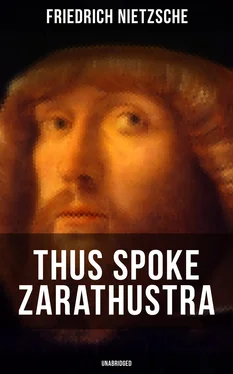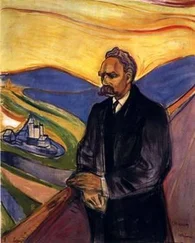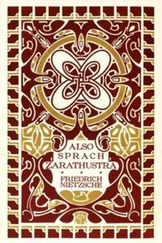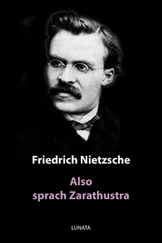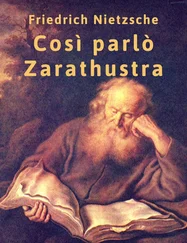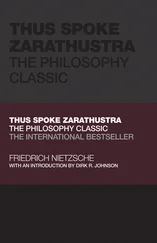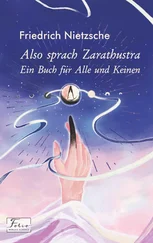I love him whose soul is deep even in the wounding, and may succumb through a small matter: thus goeth he willingly over the bridge.
I love him whose soul is so overfull that he forgetteth himself, and all things are in him: thus all things become his down-going.
I love him who is of a free spirit and a free heart: thus is his head only the bowels of his heart; his heart, however, causeth his down-going.
I love all who are like heavy drops falling one by one out of the dark cloud that lowereth over man: they herald the coming of the lightning, and succumb as heralds.
Lo, I am a herald of the lightning, and a heavy drop out of the cloud: the lightning, however, is the Superman . —
5.
When Zarathustra had spoken these words, he again looked at the people, and was silent. “There they stand,” said he to his heart; “there they laugh: they understand me not; I am not the mouth for these ears.
Must one first batter their ears, that they may learn to hear with their eyes? Must one clatter like kettledrums and penitential preachers? Or do they only believe the stammerer?
They have something whereof they are proud. What do they call it, that which maketh them proud? Culture, they call it; it distinguisheth them from the goatherds.
They dislike, therefore, to hear of ‘contempt’ of themselves. So I will appeal to their pride.
I will speak unto them of the most contemptible thing: that, however, is the last man !”
And thus spake Zarathustra unto the people:
It is time for man to fix his goal. It is time for man to plant the germ of his highest hope.
Still is his soil rich enough for it. But that soil will one day be poor and exhausted, and no lofty tree will any longer be able to grow thereon.
Alas! there cometh the time when man will no longer launch the arrow of his longing beyond man—and the string of his bow will have unlearned to whizz!
I tell you: one must still have chaos in one, to give birth to a dancing star. I tell you: ye have still chaos in you.
Alas! There cometh the time when man will no longer give birth to any star. Alas! There cometh the time of the most despicable man, who can no longer despise himself.
Lo! I show you the last man .
“What is love? What is creation? What is longing? What is a star?”— so asketh the last man and blinketh.
The earth hath then become small, and on it there hoppeth the last man who maketh everything small. His species is ineradicable like that of the ground-flea; the last man liveth longest.
“We have discovered happiness”— say the last men, and blink thereby.
They have left the regions where it is hard to live; for they need warmth. One still loveth one’s neighbour and rubbeth against him; for one needeth warmth.
Turning ill and being distrustful, they consider sinful: they walk warily. He is a fool who still stumbleth over stones or men!
A little poison now and then: that maketh pleasant dreams. And much poison at last for a pleasant death.
One still worketh, for work is a pastime. But one is careful lest the pastime should hurt one.
One no longer becometh poor or rich; both are too burdensome. Who still wanteth to rule? Who still wanteth to obey? Both are too burdensome.
No shepherd, and one herd! Every one wanteth the same; every one is equal: he who hath other sentiments goeth voluntarily into the madhouse.
“Formerly all the world was insane,”— say the subtlest of them, and blink thereby.
They are clever and know all that hath happened: so there is no end to their raillery. People still fall out, but are soon reconciled—otherwise it spoileth their stomachs.
They have their little pleasures for the day, and their little pleasures for the night, but they have a regard for health.
“We have discovered happiness,”— say the last men, and blink thereby. —
And here ended the first discourse of Zarathustra, which is also called “The Prologue”: for at this point the shouting and mirth of the multitude interrupted him. “Give us this last man, O Zarathustra,”— they called out—“make us into these last men! Then will we make thee a present of the Superman!” And all the people exulted and smacked their lips. Zarathustra, however, turned sad, and said to his heart:
“They understand me not: I am not the mouth for these ears.
Too long, perhaps, have I lived in the mountains; too much have I hearkened unto the brooks and trees: now do I speak unto them as unto the goatherds.
Calm is my soul, and clear, like the mountains in the morning. But they think me cold, and a mocker with terrible jests.
And now do they look at me and laugh: and while they laugh they hate me too. There is ice in their laughter.”
6.
Then, however, something happened which made every mouth mute and every eye fixed. In the meantime, of course, the rope-dancer had commenced his performance: he had come out at a little door, and was going along the rope which was stretched between two towers, so that it hung above the market-place and the people. When he was just midway across, the little door opened once more, and a gaudily-dressed fellow like a buffoon sprang out, and went rapidly after the first one. “Go on, halt-foot,” cried his frightful voice, “go on, lazy-bones, interloper, sallow-face!—lest I tickle thee with my heel! What dost thou here between the towers? In the tower is the place for thee, thou shouldst be locked up; to one better than thyself thou blockest the way!”— And with every word he came nearer and nearer the first one. When, however, he was but a step behind, there happened the frightful thing which made every mouth mute and every eye fixed—he uttered a yell like a devil, and jumped over the other who was in his way. The latter, however, when he thus saw his rival triumph, lost at the same time his head and his footing on the rope; he threw his pole away, and shot downwards faster than it, like an eddy of arms and legs, into the depth. The market-place and the people were like the sea when the storm cometh on: they all flew apart and in disorder, especially where the body was about to fall.
Zarathustra, however, remained standing, and just beside him fell the body, badly injured and disfigured, but not yet dead. After a while consciousness returned to the shattered man, and he saw Zarathustra kneeling beside him. “What art thou doing there?” said he at last, “I knew long ago that the devil would trip me up. Now he draggeth me to hell: wilt thou prevent him?”
“On mine honour, my friend,” answered Zarathustra, “there is nothing of all that whereof thou speakest: there is no devil and no hell. Thy soul will be dead even sooner than thy body: fear, therefore, nothing any more!”
The man looked up distrustfully. “If thou speakest the truth,” said he, “I lose nothing when I lose my life. I am not much more than an animal which hath been taught to dance by blows and scanty fare.”
“Not at all,” said Zarathustra, “thou hast made danger thy calling; therein there is nothing contemptible. Now thou perishest by thy calling: therefore will I bury thee with mine own hands.”
When Zarathustra had said this the dying one did not reply further; but he moved his hand as if he sought the hand of Zarathustra in gratitude.
7.
Meanwhile the evening came on, and the market-place veiled itself in gloom. Then the people dispersed, for even curiosity and terror become fatigued. Zarathustra, however, still sat beside the dead man on the ground, absorbed in thought: so he forgot the time. But at last it became night, and a cold wind blew upon the lonely one. Then arose Zarathustra and said to his heart:
Verily, a fine catch of fish hath Zarathustra made to-day! It is not a man he hath caught, but a corpse.
Читать дальше
